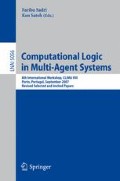Abstract
Failures are unavoidable in many circumstances. For example, an agent may fail at some point to perform a task in a dynamic environment. Robust systems typically have mechanisms to handle such failures. Temporal logic is a widely used representation language for reasoning about the behaviour of systems, although dealing with failures is not part of the language. In this paper, it is investigated how interval temporal logic can be extended with an operator describing failure. This logic has a close relationship to exception handling mechanisms in programming languages, which provides an elegant mechanism for modelling and handling failures. The approach is motivated from the context of specification of systems that have to operate in highly dynamic environments. A case study of the formal modelling and verification of the treatment of diabetes mellitus type 2 illustrates the practical usefulness of the approach.
Access this chapter
Tax calculation will be finalised at checkout
Purchases are for personal use only
Preview
Unable to display preview. Download preview PDF.
References
Alves-Foss, J., Lam, F.S.: Dynamic denotational semantics of Java. In: Alves-Foss, J. (ed.) Formal Syntax and Semantics of Java. LNCS, vol. 1523. Springer, Heidelberg (1999)
Balser, M.: Verifying Concurrent Systems with Symbolic Execution – Temporal Reasoning is Symbolic Execution with a Little Induction. PhD thesis, University of Augsburg, Augsburg, Germany (2005)
Cau, A., Moszkowski, B.: Using PVS for interval temporal logic proofs. part 1: The syntactic and semantic encoding. Technical report, SERCentre, De Montfort University, Leicester (1996)
Giunchiglia, F., Spalazzi, L., Traverso, P.: Planning with failure. Artificial Intelligence Planning Systems, 74–79 (1994)
Hindriks, K., de Boer, F., van der Hoek, W., Meyer, J.-J.C.: Failure, monitoring and recovery in the agent language 3APL. In: De Giacomo, G. (ed.) AAAI 1998 Fall Symposium on Cognitive Robotics, pp. 68–75 (1998)
Hommersom, A.J., Groot, P.C., Lucas, P.J.F., Balser, M., Schmitt, J.: Verification of medical guidelines using background knowledge in task networks. IEEE Transactions on Knowledge and Data Engineering 19(6), 832–846 (2007)
Konikowska, B.: A three-valued linear temporal logic for reasoning about concurrency. Technical report, ICS PAS, Warsaw (1998)
Moszkowski, B.: A temporal logic for multilevel reasoning about hardware. IEEE Computer 18(2), 10–19 (1985)
Moszkowski, B.: The programming language Tempura. Journal of Symbolic Computation 22(5/6), 730–733 (1996)
von Oheimb, D., Nipkow, T.: Machine-checking the Java specification: Proving type-safety. In: Alves-Foss, J. (ed.) Formal Syntax and Semantics of Java. LNCS, vol. 1523. Springer, Heidelberg (1999)
Rao, A.S., Georgeff, M.P.: Modeling rational agents within a BDI-architecture. In: Allen, J., Fikes, R., Sandewall, E. (eds.) Proceedings of KR 1991, pp. 473–484. Morgan Kaufmann, San Francisco (1991)
Rutten, G.E.H.M., Verhoeven, S., Heine, R.J., de Grauw, W.J.C., Cromme, P.V.M., Reenders, K.: NHG-standaard diabetes mellitus type 2 (eerste herziening). Huisarts Wet 42, 67–84 (1999)
Shahar, Y., Miksch, S., Johnson, P.: The Asgaard project: A task-specific framework for the application and critiquing of time-orientied clinical guidelines. Artificial Intelligence in Medicine 14, 29–51 (1998)
Tucker, A.B., Noonan, R.E.: Programming Languages – Principles and Paradigms, 2nd edn. McGraw-Hill, New York (2007)
Turner, R.: Logics for Artificial Intelligence. Ellis Horwood, Chichester (1985)
Author information
Authors and Affiliations
Editor information
Editors and Affiliations
Rights and permissions
Copyright information
© 2008 Springer-Verlag Berlin Heidelberg
About this paper
Cite this paper
Hommersom, A., Lucas, P. (2008). Actions with Failures in Interval Temporal Logic. In: Sadri, F., Satoh, K. (eds) Computational Logic in Multi-Agent Systems. CLIMA 2007. Lecture Notes in Computer Science(), vol 5056. Springer, Berlin, Heidelberg. https://doi.org/10.1007/978-3-540-88833-8_2
Download citation
DOI: https://doi.org/10.1007/978-3-540-88833-8_2
Publisher Name: Springer, Berlin, Heidelberg
Print ISBN: 978-3-540-88832-1
Online ISBN: 978-3-540-88833-8
eBook Packages: Computer ScienceComputer Science (R0)

